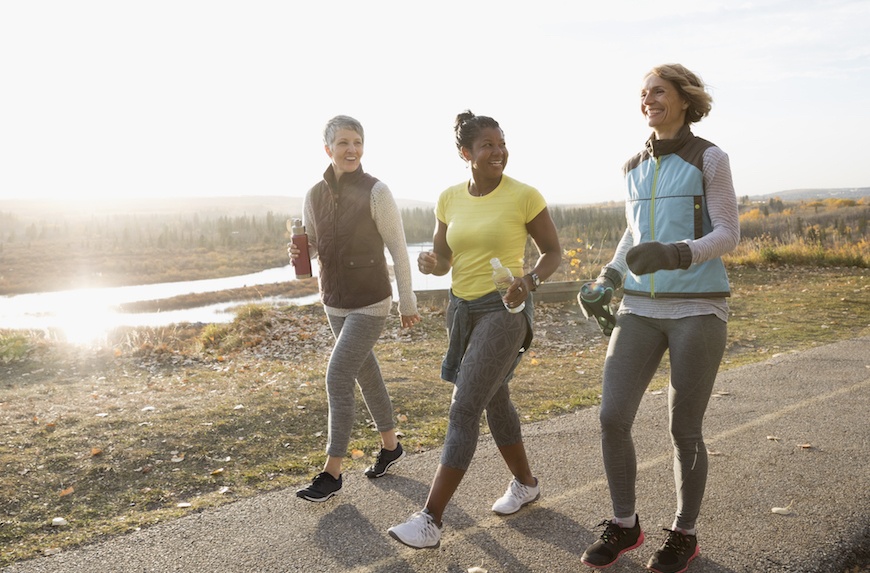7 Easy Ways to Rev up Your Metabolism After You Turn 40
But first, what exactly is metabolism and how does it affect your body after turning 40? “Metabolism [describes] the millions of chemical processes that keep your body thriving and effective,” Snyder explains. But when it's used conversationally, the word is typically used to mean how your body turns food into energy.
“As you age, your metabolism tends to decelerate by about five percent every decade after 40," Snyder says. "Estrogen levels decrease causing insulin [the hormone that regulates blood sugar] levels to increase and thyroid [your body's main metabolic rate regulator] levels to decrease." Taken together, these changes mean you're going to be hungrier, potentially leading you to consume more calories. As if that wasn’t enough, according to Snyder, research also shows that women lose muscle mass quicker than men, which also affects weight loss.
Don’t freak out though. All you need to do to reboot your metabolism, Snyder says, is improve your digestive system and mix in a little exercise.
Read on for Snyder's top tips on how to increase metabolism after 40.

1. Detox your digestive system
According to Snyder, part of the reason metabolism gets sluggish as you age is because build-up in the digestive tract clogs your system and prevents your organs from functioning at peak performance levels. “Once we remove obstructions, everything functions better, including elimination, digestion, and metabolism,” she says.
To clear out the pipes, so to speak, Snyder suggests consuming more enzymes and fiber together. Also, stay away from dairy, gluten, and refined sugars, which can clog you up by creating more mucus in your system.

{{post.sponsorText}}
2. Drink rooibos tea
Speaking of improving digestion, rooibos tea with mint is another great tool in your metabolism boosting toolkit, Snyder shares. “It’s high in antioxidants and flavonoids, which promote youthfulness and great skin, while mint is a great source for promoting better digestion,” she says. Increased metabolism and better skin? Done.
3. Load up on H20
“Researchers have discovered that drinking 48 ounces of water a day can aid a resting metabolism by about 50 calories a day,” Snyder says. But she cautions against hydrating at mealtime; some experts believe that drinking water while eating can dilute the digestive enzymes in your system, but there's no solid scientific evidence to back this up.
4. Have a smoothie for breakfast
If you’re a smoothie lover (who isn’t?), then you’ll be excited to hear that kicking off your day with some QT with your blender is a great way to fire up your metabolism in the morning. Snyder recommends her signature nutrient-packed Glowing Green Smoothie in particular.
“It's loaded with greens, lemon juice, and high-fiber fruit to pack a mega-punch of vitamins, enzymes, minerals such as blood-building iron, amino acids, and fiber,” she says. “Its high amounts of fiber combined with the enzymes help to flush pollutants and toxins out of your body, which is important for long-term vitality and youthfulness.”
5. Start your day with hot lemon water
Drinking hot water with lemon first thing in the morning is another tip Snyder recommends. “Water can increase metabolism by inducing thermogenesis, a metabolic process in which calories are burned, and lemons increase your metabolism and assist with weight loss.” So basically, this super-easy concoction helps you burn more calories while you’re getting ready in the morning. It’s a no-brainer.
6. Take the right probiotics
Snyder recommends all her clients, no matter their age, take probiotics, but to truly reap their benefits you have to make sure you're stocking up on the right kind. “I'm a big fan of soil-based organism (SBO) probiotics, which mimic the natural beneficial bacteria found in soil that our ancestors used to ingest in small amounts on unwashed veggies from the garden,” she explains.
7. Move your body
One of the most important things you can do to increase your metabolism after 40 is to stay physically active, even if it’s just going on a walk after dinner to ease digestion.
“Exercise becomes even more vital as you age,” Snyder says. “You lose muscle mass with age, which delays your metabolism. Muscle cells need energy so they burn calories and they burn more calories than fat cells even when you're not exercising. So that 15-minute stroll after dinner benefits you more than just counting your steps.”
Read on to learn 3 ways you may be slowing your metabolism without realizing it. And here are 4 of the most common misconceptions about the may your body uses energy.
Loading More Posts...